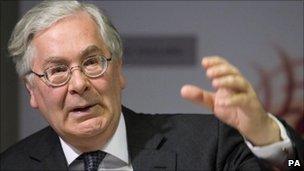Wikileaks files: Tory leaders experience questioned
- Published

Mr King is reported to have had reservations about the top Tory team prior to the election
Prime Minister David Cameron and Chancellor George Osborne are in the spotlight in the latest batch of leaked US diplomatic cables.
The cables, obtained by whistleblowing website Wikileaks, external, reveal Bank of England governor Mervyn King had doubts about the pair ahead of May's election.
Mr King feared they lacked economic experience and were too "political".
The Bank said Mr King has an "effective" working relationship with both men. No 10 declined to comment.
'Out of touch'
The leaks reveal that Mr King made his comments about the experience of senior Conservative figures to US ambassador Louis Susman at a meeting in February - just months before the general election.
It said Mr Susman wrote to US Secretary of State Hillary Clinton, in a classified dispatch, soon after reporting that Mr King had "great concerns about the Conservative leaders' lack of experience in reducing deficits".
"He [Mr King] opined that party leader David Cameron and shadow chancellor George Osborne have not fully grasped the pressures they will face from different groups when attempting to cut spending," Mr Susman is reported to have said.
When Mr King asked for details about how the two men planned to tackle the UK's huge budget deficit before the general election, Mr Susman reported that the governor told him that he had received "only generalities in return".
The Conservative leaders, Mr King is reported to have told Mr Susman, "had a tendency to think about issues only in terms of politics, and how they might affect Tory electorability". He is also said to have considered the Tory leadership lacking in "depth", telling Mr Susman that they "seemed resistant to reaching out beyond their small inner circle".
The leaked cables also say the US embassy officials were told:
David Cameron, rather than George Osborne, made an emergency speech on the economic crisis to the 2008 Tory conference partly because internal Tory polling suggested the latter lacked gravitas with the public due to his "high pitched vocal delivery"
Defence Secretary Liam Fox told the Americans the Conservatives would be tougher on Pakistan because they were "less dependent" than the Labour Party on votes from the British-Pakistani community
Two Lib Dem strategists, who now work in Downing Street, planned to brand David Cameron "out of touch with real life" ahead of the general election but the plan was dropped after the death of Mr Cameron's eldest son, Ivan, which "eliminated these vulnerabilities"
The leaks also quote a senior Tory who said that Gordon Brown's warning at the 2008 Labour conference that it was "no time for a novice" had "gained significant traction with voters".
'Children of Thatcher'
"Internal Tory spot polling had found, worryingly for the Conservatives, that contrary to the general consensus, if an election were held the next day, Gordon Brown would be re-elected, albeit with a vastly reduced majority," according to an account of the 2008 Tory conference by Richard LeBaron, deputy head of mission at the US embassy.
In another cable from Mr LeBaron, from April 2008, he writes up a meeting with William Hague, in which the then shadow chancellor speaks of the "near death" experience for the Conservatives of the election that never was a few months earlier - and reassures the Americans about the "special relationship".
"Hague asserted that he, Cameron, and Shadow Chancellor George Osborne are all "children of Thatcher" and staunch Atlanticists but acknowledged that the network of ties once binding the British public to America may not be as thick for all citizens of Britain," writes Mr LeBaron.
The leaks also reveal that Ambassador Susman tried to persuade then chancellor Alistair Darling to waive VAT on the construction of the new £475m US Embassy in Battersea, South London, but the request was refused by the then chancellor "citing the recession, tight budget and elections".
There is also analysis of relations between David Cameron and Nick Clegg ahead of the general election in a March 2009 note by Greg Berry, political counsellor at the US embassy.
Mr Berry quotes Norman Lamb, then Lib Dem health spokesman and now Mr Clegg's chief parliamentary aide, who says Mr Clegg and Mr Cameron "do not get along personally".
"Lamb said Clegg thinks Cameron is dismissive of him and Clegg refused an 'aggressive' invitation to dine at Cameron's house," says the document.
'Working relationship'
The note also reveals Mr Lamb's thoughts on a coalition government, quoting him as saying: "We see Labour as our competition, and the Conservatives as our opposition."
'Most Lib Dems, he said, are instinctively and ideologically against a coalition with the Conservatives, including "right-wing members of the party like myself," the note quotes Mr Lamb as saying.
Mervyn King has been extremely supportive of the government's deficit reduction strategy since it took office in May, a policy that has also been backed by leading business groups such as the CBI and international organisations like the IMF.
A Bank spokeswoman told the Guardian that the governor has a "very effective working relationship" with the prime minister and the chancellor.
Foreign Secretary William Hague briefed the Cabinet on Monday about the leaked cables, which have been condemned by London and Washington.
Earlier disclosures contained in the cables included criticism of British military operations in Afghanistan and claims the UK government promised to limit the scope of the Iraq war inquiry to protect US interests.